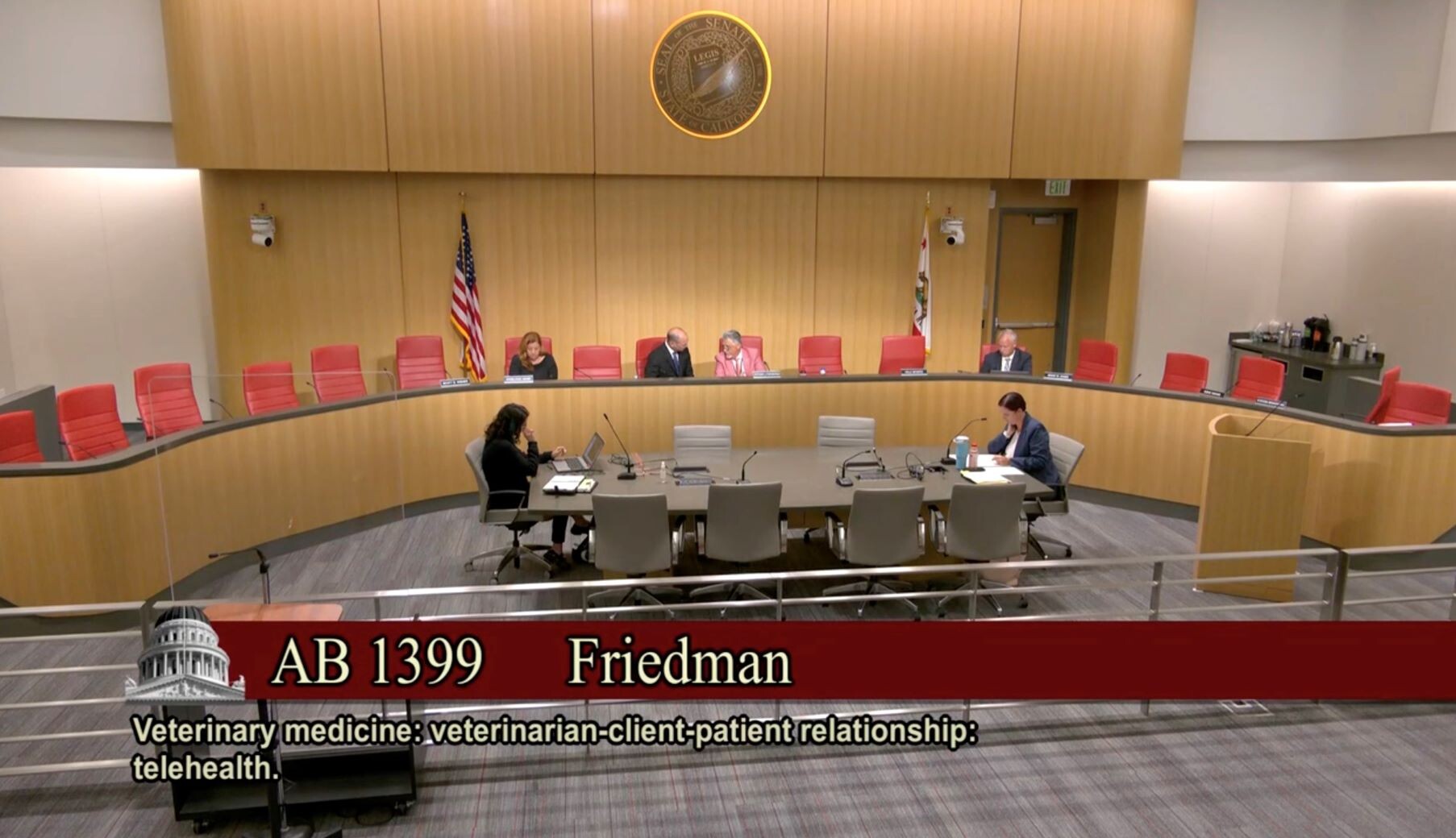Calif. veterinary telemedicine bill paused to assess costs
!This story has an important update
 Listen to this story.
Listen to this story.
Senate Appropriations Committee

VIN News Service screenshot
A bill permitting veterinary telemedicine in California sailed through the state Legislature until Aug. 21, when the Senate Appropriations Committee called for deeper fiscal evaluation.
A California bill that would relax the state's rules for veterinary telemedicine is snagged in committee while officials review its potential costs amid concern that the legislation would open the door to consumer complaints, straining regulatory resources.
Assembly Bill 1399, which would authorize veterinarians to provide remote care to patients without first having done an in-person exam, appeared en route to swift passage after the Assembly unanimously approved it on May 31. But the bill met friction during a meeting of the powerful Senate Appropriations Committee last week, when an official from the state Department of Finance expressed concern that regulating veterinary telemedicine could put a financial strain on state oversight bodies.
"Finance is currently opposed to AB 1399," Michele Perrault, the department's deputy director of legislation, told committee members. Veterinary telemedicine "could increase the risk of misdiagnosis, which could mean an increased complaint and enforcement workload for VMB," she said, referring to the state Veterinary Medical Board, which oversees practitioner licensing and conduct.
Perrault noted that the veterinary board is grappling with a "structural deficit." According to budget figures, the fund's balance is $6.5 million for fiscal year 2023-24, down from $6.9 million two years ago, reflecting a decline in fees for permits and uptick in expenses. She suggested that the board's financial instability could be exacerbated, at least in part, by telemedicine-related complaints.
In response, the Appropriations Committee routed AB 1399 to its suspense file for further scrutiny — a step typically taken with legislation that would cost the state $150,000 or more.
On Friday, the committee will review bills in the suspense file. If the veterinary telemedicine legislation fails to make it out, the bill could die when the Legislature adjourns on Sept. 14. If AB 1399 clears the suspense file, it is believed to stand a good chance of passing. If passed, then signed by the governor, the legislation would take effect in January.
Who's for, who's against
Introduced in February and originally sponsored by the Veterinary Virtual Care Association, AB 1399 is supported by the American Society for the Prevention of Cruelty to Animals and similar animal-welfare organizations. Their interest is in enhancing access to care by pet owners who are unable to visit traditional veterinary clinics or who live in areas where there are few veterinarians.
The bill also aligns with the interests of commercial telemedicine providers such as Chewy and Dutch Pet. The advocacy group VVCA receives funding from Chewy and various other pet-related businesses aiming for a foothold in the burgeoning veterinary telemedicine market.
The legislation is controversial. It is opposed by the California Veterinary Medical Board as well as the California Veterinary Medical Association and American Veterinary Medical Association.
The CVMA, which represents more than 7,000 veterinarians, is pushing for amendments that they believe would add protections for patients and the public, such as a 14-day limit on all prescriptions with one refill, and a requirement that telemedicine providers register a premises with the CVMB.
The CVMB, too, is asking for prescription limits, but only for antimicrobial drugs. "My main concern is over the misuse of antibiotics, certainly," said Dr. Barrie Grant, a CVMB board member, during the group's meeting in July. "It seems like after 14 days, antibiotics are working or they're not."
If they're not, the patient needs to be physically examined and could require diagnostics, he said.
Dr. Grant Miller, CVMA director of regulatory affairs, explained the association's stance. "We're not against the concept of telemedicine, but we, like you, have the same concerns for animal and consumer protection," he told board members.
"We know from the Ontario Veterinary Medical Association, which is one of the first jurisdictions in North America to have telemedicine instituted, that antibiotics are the No. 1 most prescribed type of drug via telemedicine," he said.
Officials from the OVMA were unavailable to confirm the statement. Additionally, the College of Veterinarians of Ontario, the regulatory body for the veterinary profession in the province where telemedicine-based VCPR has been allowed since 2018, does not monitor the prescribing behaviors of its licensed members.
Both the CVMA and CVMB want AB 1399 to incorporate the regulatory board's definition of a veterinarian-client-patient relationship, or VCPR, which is the foundation for all veterinary care. It requires that practitioners be "personally acquainted with the care of an animal by virtue of an examination."
Most states similarly require that a VCPR be established through a face-to-face meeting before moving to telemedicine, except in emergencies. The in-person rule is a response to the fact that animals can't communicate with their doctors in words, so they need to be examined hands-on.
Five states have authorized veterinarians to establish VCPRs remotely. They are Arizona, Idaho, New Jersey, Vermont and Virginia.
Similarly, the proposed legislation in California would allow a VCPR to be established using real-time video communication, giving veterinarians the latitude and responsibility to determine when doing so is appropriate.
It also would require that practitioners provide "quality of care consistent with prevailing veterinary medical practice," and "be able to provide the client with a list of nearby veterinarians who may be able to see the patient in person upon the request of the client."
Lessons from human medicine?
The push in California and elsewhere to lower barriers to veterinary telemedicine reflects an effort by advocates to parallel human medicine. Telehealth for human patients is unrestricted across all 50 U.S. states and beyond.
But there have been some apparent consequences. In Australia, for instance, regulatory bodies are reworking their telemedicine directives in response to a 413% increase in complaints during the past three years, according to a report in The Guardian.
In California, a state Medical Board official said the agency could not say whether telemedicine practice has driven an increase in complaints. "The board doesn't categorize complaints based on that criterion," Alexandria Schembra, associate governmental program analyst, said by email to the VIN News Service.
That the board is having financial difficulties has been documented. The state Department of Consumer Affairs recently borrowed $18 million from the Bureau of Automotive Repair to shore up the Medical Board's $79 million budget, which consistently is at a deficit, according to a report by California Healthline.
To generate more revenue, regulators have petitioned the Legislature to raise licensing fees from $863 to $1,289, which would make it the highest in the country. In an address to lawmakers last month, spokesperson Aaron Bone encapsulated the board's financial predicament by reading a statement from board colleagues: "The simple reality is that the board is not able to pay its bills … and as a result, a large fee increase is necessary."
Sept. 1 update: Senate leaders released AB 1399 from the suspense file and the Appropriations Committee voted 7-0 to pass it. It will now go to the Senate floor for a vote.